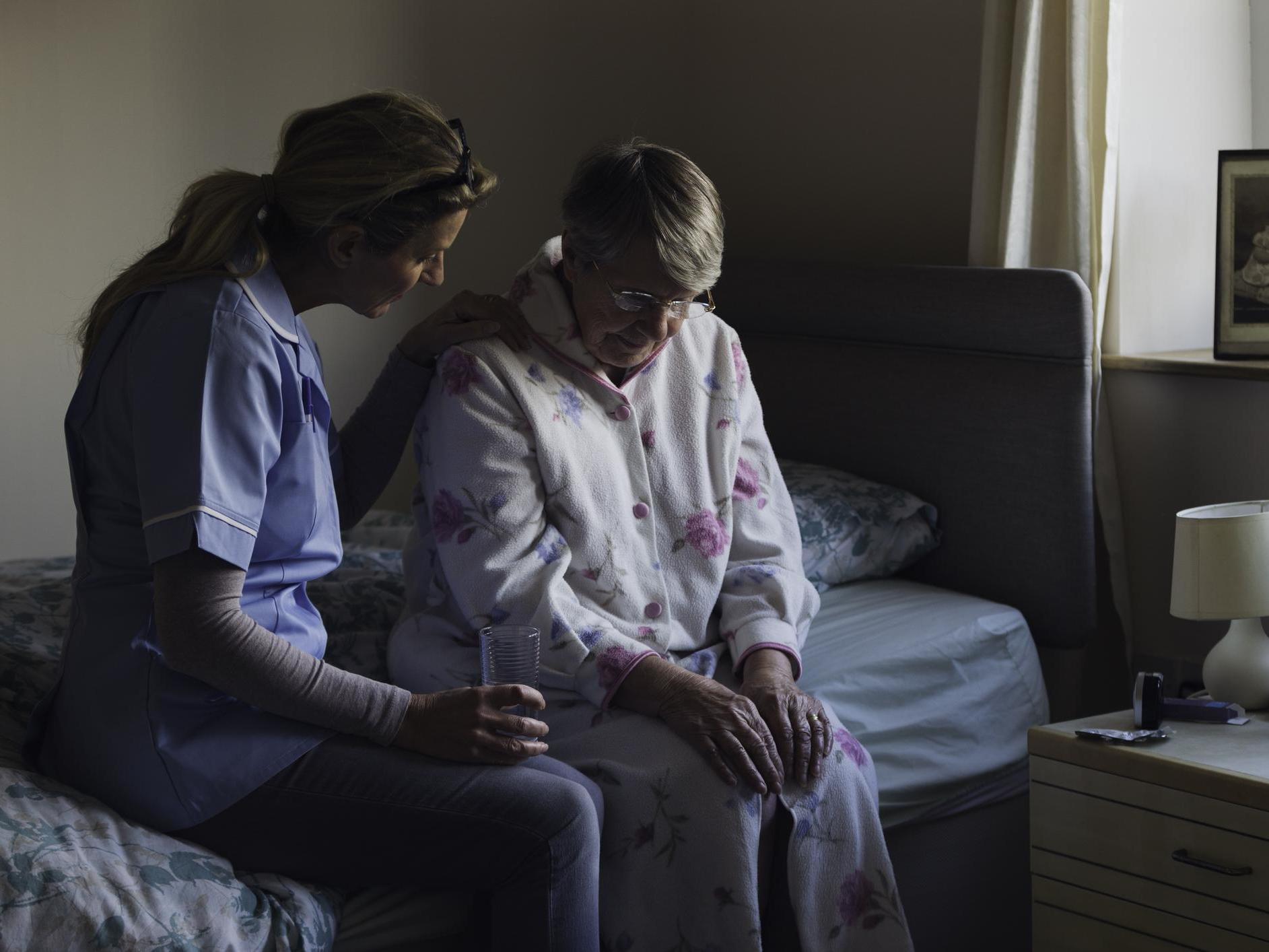If Boris Johnson had met my patients, he’d know they can’t wait five years for food and beds
The prime minister says he intends to get a social care plan ‘done’ by the end of this parliament’s term. But as a doctor who sees the daily realities of over-stretched services, waiting that long isn’t an option, writes Berenice Langdon


I’m doing a home visit,” I told the reception team in case they needed to find me. “It’s not going to be pretty.”
It wasn’t. The flat’s front door was opened by a woman only half-dressed, wearing an overcoat to offset the lack of underwear. As she shuffled into the front room, the smell was almost like a physical blow; urine, old food rotting and stale air. I had to grab a breath from the hallway to acclimatise, my eyes watering. Wearing masks, gowns and shoe guards, the district nurses had been heroically caring for her. Because she had run out of food, they had also popped to the shops and brought back milk and bread.
I’ve had adult safeguarding training but no one would need training to know that this was a vulnerable adult. As soon as I returned to the clinic, I telephoned social services. I wanted a deep clean, home helps twice a day to wash and dress her, and meals on wheels. Mrs Olgilvie was mobile and alert, she would do well.
I don’t know what I thought would happen when I rang. That it would be like, I don’t know, “paw patrol”. That I would get straight through and a team would swing into action the same day.
“The case worker is aware,” the dulled voice of the duty social worker informed me after a 30-minute wait. “Assessment in two to three weeks. Yes. The district nurses let us know two weeks ago. Mmm. I can see another notification from your GP colleague last week. No food? I will let him know. Try interim care.”
I tried to sell it to interim care, an agency invented to sort out urgent social care the same day, because social services can’t, but they advised me – by email 2 days later – that the environment “was not safe for their workers to go into”. Before I could take things further (but what would I have done?) the patient had a fall and was admitted.
Even then, I had a feeling Mrs Olgilvie would be discharged without a proper home assessment and dropped off at the front door. It took 40 minutes to find which ward she had been admitted to and to persuade the senior nurse that she wanted to talk to me. “Yes, we are aware that she has been off her food recently.” SHE HAS RUN OUT OF FOOD. “And that her home is untidy.” IT IS UNHYGIENIC.
So now she is taking up a hospital bed specifically because of social care issues.
When I worked in care of the elderly, I had 24 patients on the ward (plus two more squeezed into the ward entrance area with temporary screens). It didn’t take me longer than my first solitary five-hour ward round before I realised I actually had only seven patients but 19 residents, some of whom had been stuck there for five months and were still there when I left.
The consultant, in that eccentric way consultants have, would only discharge patients on a Tuesday. This was so that if they bounced back, we would have time to sort things out before the weekend. Each discharge had to be worked on by the occupational therapist, the social worker and the physiotherapist. Often, they would take the patient home on a visit to check things would work out before the big day when they were discharged. The difficulties of obtaining home helps or nursing home placements led to long delays and meant we only ever had room to accept three or four new patients a week.
Recent figures suggest that this bed blocking is still the rule and that in England, over 4,000 beds a day are occupied by patients waiting for social care. It’s an expensive way of running things; approximately £2,800 a week in hospital compared to £600 in a care home.
Boris Johnson has reiterated that with regard to social care, he intends to “get it done within this parliament” and that social care is “complex”, which I suppose is true. But it doesn’t need to be sorted out all at once, in one massive complicated plan, and it needs to be done sooner than at the end of this parliament’s term in five years’ time. Action can be taken now and it can be taken piecemeal.
Take Mrs Olgilvie. An urgent social services assessment the day she was referred would have been appropriate and was delayed presumably due to workload issues. To prevent more cases like these, we need to recruit and train more social workers right now. And while we are at it, we need to launch a social media campaign to stop demonising social workers who are often damned if they do interfere and then damned if they don’t.
My patient also needed an urgent respite residential home placement for two to three days to allow her home to be deep cleaned. Not enough residential homes are available in the first place – they need to be built, and fast.
Mrs Olgilvie also needed home helps. We know that we are short of home helps by 122,000. A system of qualification and registration for home helps to make them self-employed and monitored under Ofsted, just like childminders, could boost carer numbers, respect for the profession and employment levels.
Once in hospital, Mrs Olgilvie needed to be discharged promptly to a nursing home. More nursing homes would help with freeing up acute care hospital beds.
Which leads us onto paying for social care. As Johnson says so succinctly; “This is a big, big thing. I mean, this is a potentially massive change in the way we fund social care, and we’ve got to get it right.’’ It’s big in terms of salaries too. Paying carers £8.50 an hour is not the way to build a stable, well respected profession.
All of these changes need to happen promptly, not in five years’ time. If we choose to wait, then we must be aware that we are actively making a choice to leave elderly people like Mrs Olgilvie to live in conditions not fit for human habitation.
I wish that we could act promptly, so that the next time I see a patient like Mrs Oliglive I will be able to immediately access social care and make sure she is dressed, clean and fed. And then I could focus on her medical worries, which we never even got round to.
Berenice Langdon is a GP in southwest London and author of ‘Learning Microbiology Through Clinical Consultation’
Join our commenting forum
Join thought-provoking conversations, follow other Independent readers and see their replies
Comments